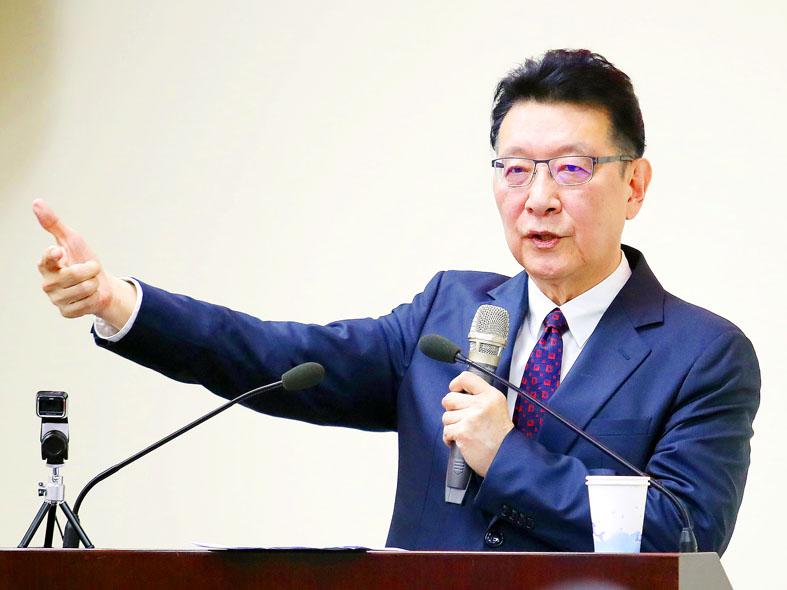Broadcasting Corp of China chairman Jaw Shaw-kong (趙少康) yesterday said he would not be running for chairman of the Chinese Nationalist Party (KMT).
He had initially expressed an interest in seeking the position with the intention of “saving the party and the country,” said Jaw, who rejoined the KMT in February.
However, there was no need for the KMT Central Standing Committee to revise a requirement in the party’s election regulations stipulating that a chairperson candidate must have been a party member for at least one year, he said.

Photo: CNA
He would not be running for KMT chairperson regardless of whether the committee modifies the rules of the chairperson election, which is expected to take place in July, “because there is more than one way to serve the country,” he said.
Jaw, a former lawmaker, said he had been a member of the KMT for more than two decades before leaving it in 1993 to cofound the New Party.
After losing the Taipei mayoral race to then-Democratic Progressive Party (DPP) candidate Chen Shui-bian (陳水扁) in 1994, Jaw retired from politics and became a media personality who now hosts several political talk shows on radio, television and the Internet.
Jaw announced his decision at a meeting of the KMT Central Standing Committee to which he had been invited.
In his speech to the committee, titled “Peace, Endeavor, Save Taiwan,” he outlined his criticisms of the KMT and the DPP, and cited the crises facing the nation as grounds for his return to politics.
He listed the closure last year of the CTi News channel and the appointment of Wu Ming-hung (吳明鴻), a cousin-in-law of President Tsai Ing-wen (蔡英文), as head of the Supreme Administrative Court, as examples of what he referred to as the DPP’s “authoritarian” ways.
He also accused the DPP of corruption and said that its “anti-China” position had “pushed Taiwan into a very dangerous position.”
No one, including the KMT, is keeping the DPP’s power in check, Jaw said, accusing the DPP of failing to take care of disadvantaged groups, respect democracy or insist on peace.
He believed the nation’s economy was overly dependent on China, while its military was overly dependent on the US, he added.
Despite the DPP “doing so badly,” the KMT continues to lose elections in part because it is “too old and too conservative,” and “too far away from the people,” Jaw said.
The KMT “is already in opposition, [but] still thinks it is in power,” he said.
He described the KMT as being simultaneously afraid of the DPP and the Chinese Communist Party, and afraid of loudly stating its own position and contributions to the nation.
Even if the KMT is united, it might not necessarily win, Jaw said, but added that without unity within the party, it was certain to lose.
He called for a “thorough reform” of the KMT.
In his recommendations to the committee, he said it would be best if being the chairperson was the KMT chairperson’s sole duty when the party is in opposition.
However, the president should be allowed to double as KMT chairperson when the party is in power, he said.
He also reiterated a previous suggestion that the KMT reduce the number of people on its Central Standing Committee.

An essay competition jointly organized by a local writing society and a publisher affiliated with the Chinese Communist Party (CCP) might have contravened the Act Governing Relations Between the People of the Taiwan Area and the Mainland Area (臺灣地區與大陸地區人民關係條例), the Mainland Affairs Council (MAC) said on Thursday. “In this case, the partner organization is clearly an agency under the CCP’s Fujian Provincial Committee,” MAC Deputy Minister and spokesperson Liang Wen-chieh (梁文傑) said at a news briefing in Taipei. “It also involves bringing Taiwanese students to China with all-expenses-paid arrangements to attend award ceremonies and camps,” Liang said. Those two “characteristics” are typically sufficient

A magnitude 5.9 earthquake that struck about 33km off the coast of Hualien City was the "main shock" in a series of quakes in the area, with aftershocks expected over the next three days, the Central Weather Administration (CWA) said yesterday. Prior to the magnitude 5.9 quake shaking most of Taiwan at 6:53pm yesterday, six other earthquakes stronger than a magnitude of 4, starting with a magnitude 5.5 quake at 6:09pm, occurred in the area. CWA Seismological Center Director Wu Chien-fu (吳健富) confirmed that the quakes were all part of the same series and that the magnitude 5.5 temblor was

The brilliant blue waters, thick foliage and bucolic atmosphere on this seemingly idyllic archipelago deep in the Pacific Ocean belie the key role it now plays in a titanic geopolitical struggle. Palau is again on the front line as China, and the US and its allies prepare their forces in an intensifying contest for control over the Asia-Pacific region. The democratic nation of just 17,000 people hosts US-controlled airstrips and soon-to-be-completed radar installations that the US military describes as “critical” to monitoring vast swathes of water and airspace. It is also a key piece of the second island chain, a string of

The Central Weather Administration has issued a heat alert for southeastern Taiwan, warning of temperatures as high as 36°C today, while alerting some coastal areas of strong winds later in the day. Kaohsiung’s Neimen District (內門) and Pingtung County’s Neipu Township (內埔) are under an orange heat alert, which warns of temperatures as high as 36°C for three consecutive days, the CWA said, citing southwest winds. The heat would also extend to Tainan’s Nansi (楠西) and Yujing (玉井) districts, as well as Pingtung’s Gaoshu (高樹), Yanpu (鹽埔) and Majia (瑪家) townships, it said, forecasting highs of up to 36°C in those areas